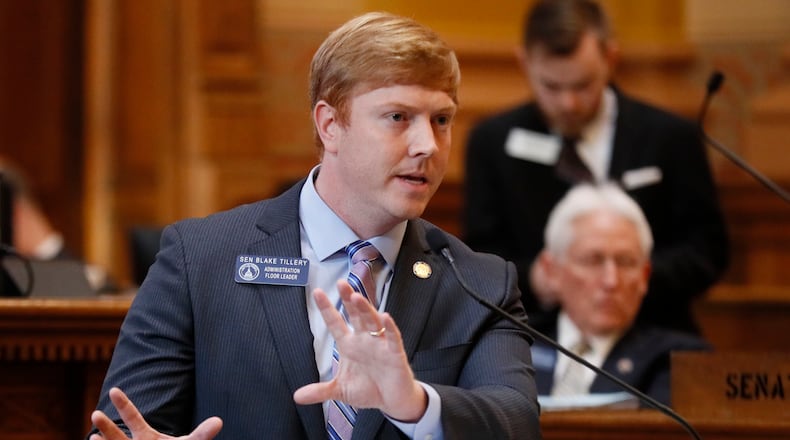The Georgia House in early March passed a $28 billion budget for the upcoming fiscal year that included pay raises for more than 200,000 teachers and state workers, and mitigated spending reductions that Gov. Brian Kemp had ordered.
Georgia Senate leaders made it abundantly clear Wednesday how much the state’s financial situation has changed.
The coronavirus pandemic and recession wrecked those earlier plans, and the Senate Appropriations Committee passed a new budget Wednesday that cuts $1 billion in k-12 school funding, lays off and furloughs staffers, and reduces spending on dozens of programs ranging from road construction to treatment for substance abuse and mental illness.
"To call this an unusual and abnormal time would be an understatement," said Senate Appropriations Chairman Blake Tillery, R-Vidalia. "Today, the headlines of January and February feel like distant history.
“Due to the current predicament, there will be less,” he added. “There is no reason to sugarcoat that. Our state budget must balance, we don’t have keys to a printing press.”
Tillery said the spending plan, which reduces spending by $2.6 billion in the fiscal year that starts July 1, still puts more than half of the budget into education. And proposed furloughs for the Georgia State Patrol and the GBI were not included in the plan.
The full Senate may vote on the budget as early as Friday. If approved, it heads to the House for its consideration next week.
Lawmakers returned to the Capitol on Monday after a three-month hiatus brought on by the coronavirus pandemic. Legislators knew they’d be coming to Atlanta to cut spending dramatically.
The pandemic brought record unemployment, and thousands of businesses either closed or struggle to remain open. That, in turn, has sent state tax collections — mostly for income and sales taxes — plummeting.
Because lawmakers expect less revenue, they face cutting funding for everything from k-12 schools and universities to the Georgia State Patrol, food safety inspections, highway construction, mental health and substance abuse programs, and county health departments.
Under budget plans that agencies submitted last month, more than 1,000 filled jobs would be eliminated and tens of thousands of state employees would be furloughed.
Several agencies said they’d need to give employees two days off a month without pay, but the Senate plan reduces furloughs to once a month or less and still meets the goal of cutting spending 11%.
Under the proposal, how many days staffers would have to go without pay depends on where they work. Many agencies show no furlough days. Those who work in some judicial agencies, such as judges and public defenders, may be required to take six furlough days if they earn more than $100,000 a year. Public health workers, who have been fighting the coronavirus pandemic, would have to take 12 furlough days next year.
A department proposal for the State Patrol called for officers to take 24 furlough days next year to meet budget cut targets. But Tillery said senators were able to find savings in other areas to avoid having to make the State Patrol take off almost five weeks without pay.
State lawmakers agreed to take an 11% pay cut in their $17,000 salary to reduce staff furloughs in House and Senate offices. Lt. Gov. Geoff Duncan, who is paid about $90,000 a year, took a 14% cut.
While basic k-12 funding would be cut, Tillery said the Senate plan increases spending in areas meant to help low-wealth school districts. He also said funding for pre-kindergarten classes would not be cut, in large part because lottery sales — which pay for them — have remained strong during the recession.
The University System of Georgia’s budget would be cut 11%, like most agencies. Colleges and universities have already presented proposals to eliminate or freeze jobs and furlough employees.
The proposal also calls for almost $1 billion in borrowing for construction projects, including $342 million for schools.
Georgia’s Transportation Department would see funding cut more than $200 million for construction and maintenance programs. A long list of mental health, substance abuse treatment and health care programs would see funding reduced, including programs to train more doctors at the Morehouse School of Medicine and Mercer University’s medical school. County health departments would receive $14 million less next year, public libraries $3.2 million less for materials. The GBI would freeze dozens of positions for investigators, scientists and lab technicians.
Senators are looking for other ways to mitigate spending cuts by raising revenue, but so far, House leaders have rejected those ideas.
Georgia senators are looking at eliminating or reducing about 40 special-interest tax breaks lawmakers have passed over the years. House Speaker David Ralston, R-Blue Ridge, shot down that proposal Tuesday.
Ralston has also rejected the idea of increasing cigarette taxes to raise money, something that health advocates have longed promoted.
About the Author
Keep Reading
The Latest
Featured



